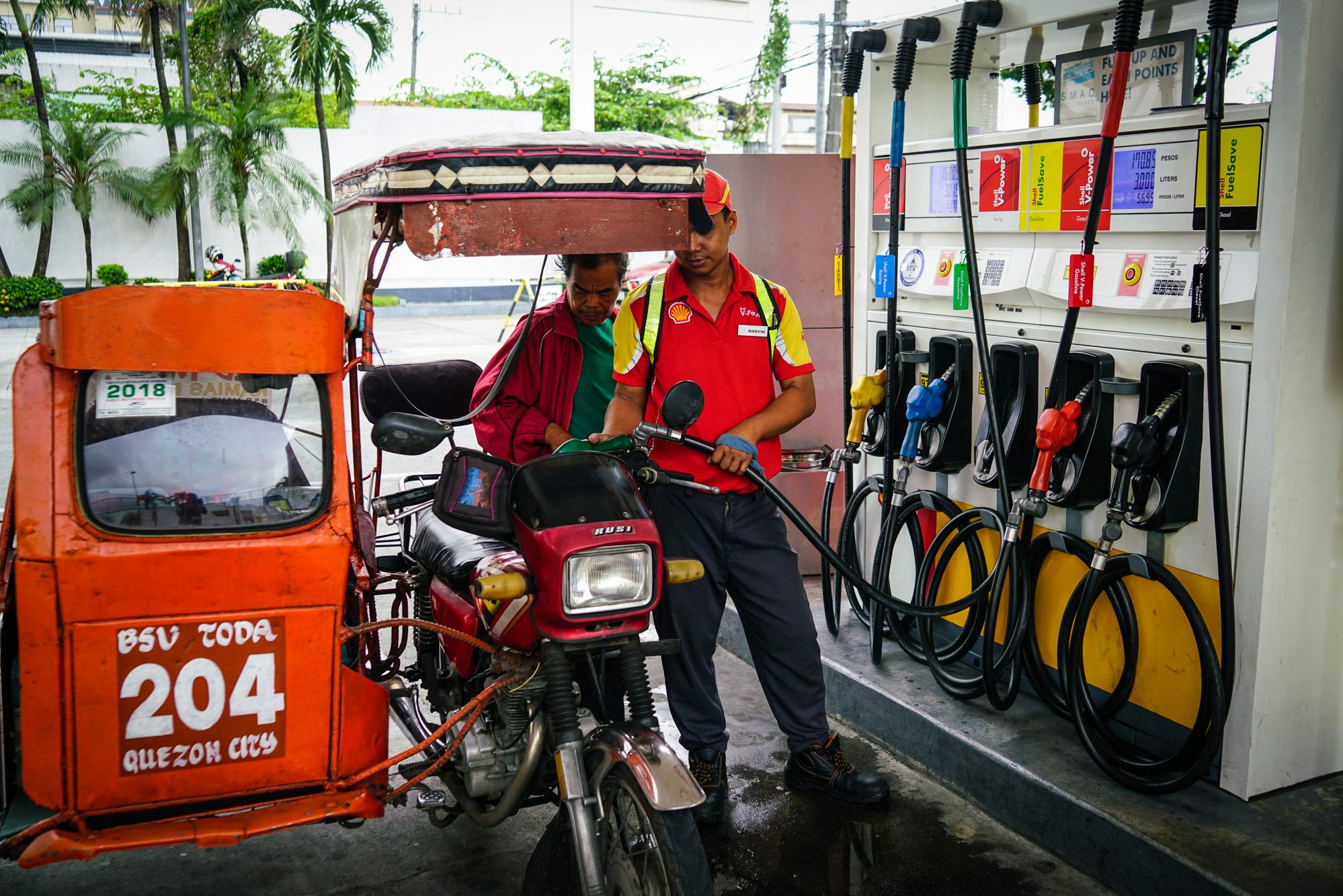SUMMARY
This is AI generated summarization, which may have errors. For context, always refer to the full article.

MANILA, Philippines (3rd UPDATE) – President Rodrigo Duterte will suspend the second round of higher excise tax on fuel under the Tax Reform for Acceleration and Inclusion (TRAIN) law, in response to soaring inflation.
In a statement on Sunday, October 14, Finance Secretary Carlos Dominguez III said the P2 per liter increase in excise tax originally set to take effect January 1, 2019, will be put on hold.
The increase would have brought the total excise tax on gasoline from P7 to P9 per liter, and on diesel from P2.50 to P4.50 per liter.
“After consulting the leadership of both the Senate and the House of Representatives, as well as the economic team, the President is confident that this course of action will help anchor inflation expectations for the coming year, allow the public to manage their finances better, and disallow hoarders and profiteers from taking advantage of the situation,” said Dominguez.
Opposition lawmakers both in the Senate and in the House of Representatives earlier filed separate resolutions calling for the suspension of the fuel tax hike.
Under the TRAIN law, excise tax on fuel would be increased from 2018 to 2020.
But the law allows the suspension of the hike if the average price of Dubai crude exceeds $80 per barrel – something which has already happened.
“Today’s price and multiple estimates of crude prices over the next two months show that the average price will stay above the $80 threshold, and it is therefore being announced early that the suspension mechanism will be activated,” Dominguez said.
Lawmakers’ backing
Since the implementation of the TRAIN law on January 1, 2018, gasoline prices have increased by as much as P10.50 per liter, diesel prices by P12, and kerosene by P14.12.
Aside from the suspension of the fuel excise tax hike, opposition senators also want a levy rollback to rates as of December 31, 2017.
“Isang panalo ito (decision to suspend the hike) para sa minority bloc at makatutulong sa pagtulak namin sa joint minority resolution para tanggalin na ang excise tax ng TRAIN law sa produktong petrolyo. Inaasahan namin na susuportahan na ito ng buong Senado,” said Senate Minority Leader Franklin Drilon and his fellow opposition senators Francis Pangilinan, Antonio Trillanes IV, Leila de Lima, and Risa Hontiveros, in a joint statement on Sunday.
(This is a victory for the minority bloc and would help in our push for the joint minority resolution seeking to remove the fuel excise tax under the TRAIN law. We are optimistic that the entire Senate will support this.)
Senate Majority Leader Juan Miguel Zubiri on Sunday sent to reporters an October 9 letter from majority senators, addressed to Duterte. They sought the President’s support for the suspension of fuel excise tax hikes for 2019 and 2020.
“We earnestly believe that such suspension of oil excise tax increases would greatly help lift the heavy burden [Filipinos] carry because of high basic commodity prices,” the majority senators said in their letter.
Burden of inflation
The Philippines’ inflation rate had jumped to 6.7% in September, the highest in more than 9 years, or since February 2009 when inflation was at 7.2%. (READ: FAST FACTS: Philippine inflation rate over the years)
“The prices of basic goods have gone up and the government recognizes that those who have been affected the most are poor Filipino families who likewise need the most help,” Dominguez said.
These families, said minority lawmakers from the House, need more immediate relief.
“While a suspension of the scheduled increases in 2019 will at the very least help to stem the tide and prevent the situation from getting any worse, it does nothing to relieve those who are now suffering from the relentless increase in prices,” said the People’s Minority, led by Marikina 2nd District Representative Miro Quimbo.
The Quimbo-led minority bloc said that “the anti-poor imposition of excise tax on kerosene and diesel” must be repealed.
The World Bank previously warned that surging prices of basic goods could slow down efforts to reduce poverty in the Philippines. (READ: EXPLAINER: How inflation affects you)
A Pulse Asia survey conducted last September showed that 51% of Filipinos disapprove of how the Duterte administration is handling inflation.
In a bid to ease inflation, Duterte earlier issued Administrative Order (AO) No. 13, removing non-tariff barriers in the importation of agricultural products.
In AO No. 13, Duterte said non-tariff barriers “unduly add to the costs of importation and limit supply, which in turn push up the prices of agricultural commodities to the detriment of Filipino consumers, especially the poor.” – Rappler.com
Add a comment
How does this make you feel?
There are no comments yet. Add your comment to start the conversation.